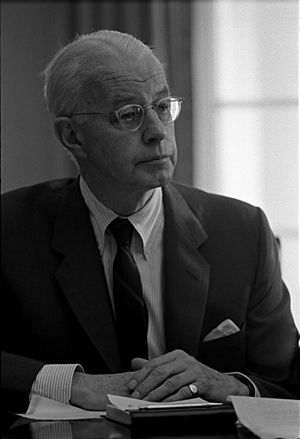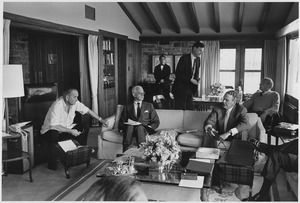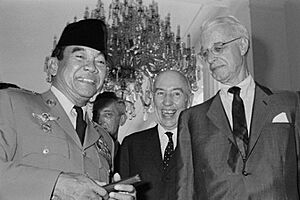Ellsworth Bunker facts for kids
Quick facts for kids
Ellsworth Bunker
|
|
|---|---|

Bunker in 1965
|
|
| United States Ambassador to South Vietnam | |
| In office April 5, 1967 – May 11, 1973 |
|
| President | Lyndon Johnson Richard Nixon |
| Preceded by | Henry Cabot Lodge Jr. |
| Succeeded by | Graham Martin |
| United States Ambassador to the Organization of American States | |
| In office January 29, 1964 – November 7, 1966 |
|
| President | Lyndon B. Johnson |
| Preceded by | deLesseps Story Morrison |
| Succeeded by | Sol Linowitz |
| United States Ambassador to India | |
| In office November 28, 1956 – March 23, 1961 |
|
| President | Dwight D. Eisenhower John F. Kennedy |
| Preceded by | John Sherman Cooper |
| Succeeded by | John Kenneth Galbraith |
| United States Ambassador to Italy | |
| In office May 7, 1952 – April 3, 1953 |
|
| President | Harry S. Truman Dwight D. Eisenhower |
| Preceded by | James Clement Dunn |
| Succeeded by | Clare Boothe Luce |
| United States Ambassador to Argentina | |
| In office March 13, 1951 – March 12, 1952 |
|
| President | Harry S. Truman |
| Preceded by | Stanton Griffis |
| Succeeded by | Albert F. Nufer |
| Personal details | |
| Born | May 11, 1894 Yonkers, New York, U.S. |
| Died | September 27, 1984 (aged 90) Brattleboro, Vermont, U.S. |
| Spouses |
Harriet Allen Butler
(m. 1920; died 1964)Carol Laise
(m. 1967) |
| Alma mater | Yale University |
| Profession | Businessman and diplomat |
| Awards | |
Ellsworth F. Bunker (May 11, 1894 – September 27, 1984) was an American businessman and a very important diplomat. A diplomat is someone who represents their country in other nations. He served as the United States ambassador to several countries, including Argentina, Italy, India, Nepal, and South Vietnam.
Bunker is well-known for his strong support of the Vietnam War during the 1960s and 1970s. He was seen as a "hawk," which means he favored military action and a strong stance in the war. He is also one of only two people to receive the Presidential Medal of Freedom twice. This is a very high award given by the U.S. President.
Early Life and Education
Ellsworth Bunker was born on May 11, 1894, in Yonkers, New York. He was the oldest of three children. His father, George Raymond Bunker, helped start and lead the National Sugar Refining Company.
His younger brother, Arthur Hugh Bunker, was also a successful businessman. During World War II, Arthur helped manage the War Production Board, which organized factories to make supplies for the war.
Ellsworth Bunker went to Yale University and graduated in 1916. He studied to become a lawyer. During World War II, he also helped the government with sugar production.
Ellsworth Bunker's Career as a Diplomat
Bunker first worked in his father's company, National Sugar Refining Company. He became the company's president in 1942. In 1951, he retired from his business role and bought a large dairy farm in Putney, Vermont.

After his business career, Bunker began working for the U.S. government. President Harry S. Truman appointed him as the United States Ambassador to Argentina in 1951. An ambassador is the highest-ranking diplomat who represents their country in another nation.
He then became the United States Ambassador to Italy in 1952. From 1953 to 1956, he was the president of the American Red Cross, a humanitarian organization.
In 1956, President Dwight D. Eisenhower appointed him as the ambassador to India and Nepal. While there, he played an important role in helping the U.S. and India work together. In 1962, he helped mediate an agreement about Western New Guinea.
After returning to Washington, D.C., he became the U.S. ambassador to the Organization of American States (OAS) from 1964 to 1966. The OAS is a group of countries in North and South America that work together on common issues.
President Lyndon B. Johnson then appointed him as the U.S. ambassador to South Vietnam in 1967. He served in this role until 1973. During his time in Vietnam, he strongly supported the war efforts of Presidents Johnson and Richard Nixon. He also supported U.S. military actions in nearby Laos and Cambodia.
After the Vietnam War ended, Bunker led the U.S. team that created the 1977 Torrijos–Carter Treaties. These treaties were agreements about the Panama Canal.
Ellsworth Bunker received the Presidential Medal of Freedom with Distinction twice. The first time was in 1963 from President John F. Kennedy, and the second time was in 1967 from President Lyndon B. Johnson. He is the only person to have received this high honor with distinction two times.
Personal Life
Ellsworth Bunker married Harriet Allen Butler in 1920. They had three children: John Birkbeck, Samuel Emmet, and Ellen Mudge. Harriet passed away in 1964.
In 1967, he married another ambassador, Carol C. Laise, in Nepal. Carol Laise was a friend of his first wife.
Ellsworth Bunker died on his dairy farm in Putney, Vermont, on September 27, 1984. His funeral was attended by his friend, former senator George Aiken, and former president Richard Nixon.
See also
 In Spanish: Ellsworth Bunker para niños
In Spanish: Ellsworth Bunker para niños
 | Dorothy Vaughan |
 | Charles Henry Turner |
 | Hildrus Poindexter |
 | Henry Cecil McBay |


